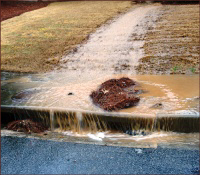For service in the Atlanta, Georgia area contact or call us:
Erosion and Sediment Control
Erosion is the process of weathering and transport of solids such as sediment, soil, rock and other particles. It is typically caused by water, wind, or living organisms such as a burrowing animal.

The rate of erosion depends upon many different factors, some of which may include the amount and intensity of the precipitation, the frequency of the storm event, wind speed, geologic factors such as the type of soil and other biological factors such as vegetative ground cover.
In recent years, the effects of erosion have significantly increased due to land development and the increase in storm water runoff associated with it. Land disturbing activity such as those involved in clearing, dredging, grading, excavating, transporting, and filling can result in soil erosion if not properly controlled by the use of Best Management Practices (BMP's). A lack of BMP's or improper installation of BMP's can result in costly damage to property.
Land Development
During construction, non-vegetated soil is often exposed to weather for an extended period of time. While the soil is exposed without vegetative ground cover, the soil is more susceptible to being transported by wind or water. When it rains, the water drops collide with the soil and loosen the soil upon impact. As it continues to rain, the soil absorbs the water, the water dissolves the soil into a liquid, and gravity carries the soil / water mixture downstream to creeks and streams. The rate of the flow of water depends on the slope of the land and the type of surface the water is flowing across. The soil will erode at a faster rate with a greater rate of flow of water i.e. erosion.
Post construction, land owners may experience erosion in areas of steep slopes, areas lacking vegetative cover and areas that are constantly exposed to stormwater. Residential and commercial properties typically experience problems with erosion in detention ponds, retention ponds, concentrated storm water pipe outlets, streams, creeks, rivers, and other areas that do not have adequate vegetative cover established.
Erosion Control Design Professionals
As erosion becomes more of a problem with increasing development. Individuals and businesses are facing problems that they have not had to deal with in the past.
Atlanta Engineering Services is well equipped to perform site inspections to determine the cause of the erosion and determine a cost effective solution that will help prevent erosion going forward. Our engineers stay up to date on the latest innovations in preventing erosion and have been certified by the Georgia Soil and Water Conservation Commission (GSWCC).
Consulting with a forensic hydrologist to investigate your property damage is your first course of action.
Additional Stormwater Drainage Information:
Find a Drainage Specialist for consultation
Yard Drainage Problems Devalues Property
Simple Solutions to Residential Drainage Problems
Learn the Benefits of Stormwater Drainage Swales
Solving Wet, Soggy Yard Problems
Common Drainage Problems of Homeowners
Preventing Crawl Space Drainage Issues
Do I have a Groundwater Spring on my Property?
Stormwater Damage from the Property Above
Stormwater Utilities and Detention Ponds
Forensic Hydrologist Evaluates Stormwater Runoff
Hydrology Expert Contact Information
Additional Services by Atlanta Engineering Services
G-ZNJ8QW23K9